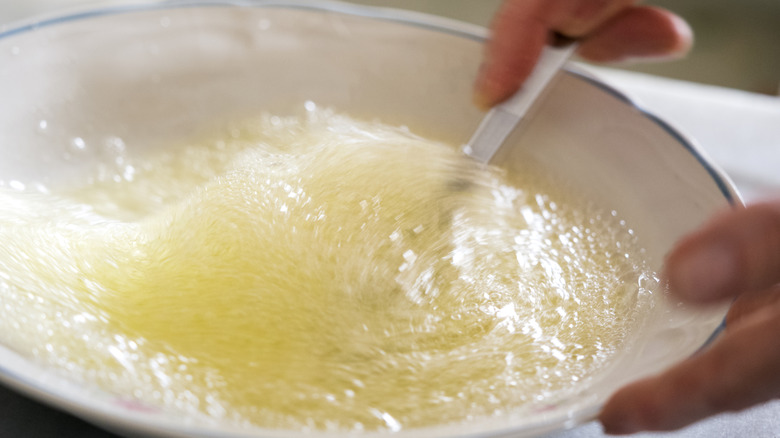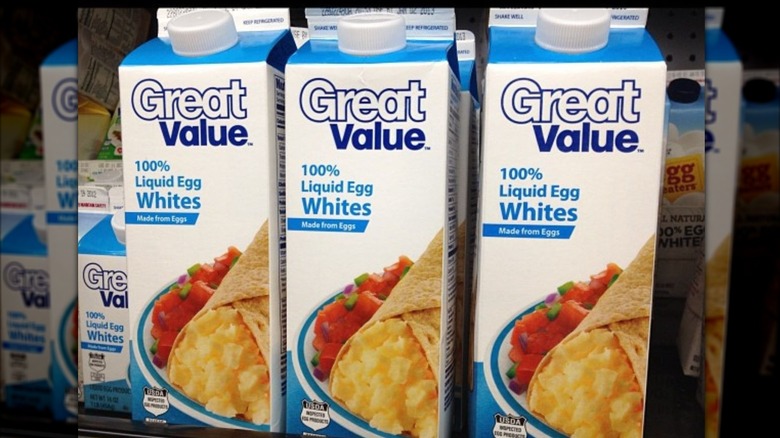What Actually Comes In Those Store-Bought Egg White Cartons?
So, you've bought a carton of pre-packaged egg whites at the store. Sure, the carton says 100% egg whites, but is that really all that's in the box? In most cases, yes; but you do need to check the ingredients label. Depending on the brand, you may see some surprising additions, such as natural flavor, salt and onion powder, spices, xanthan gum, guar gum, and maltodextrin. Fortunately, these inclusions are the exception and not the rule. The actual processing of egg whites is done entirely by complex machinery using real whole eggs.
Sanitized eggs are rolled into a large rotating wheel, appropriately called a "cracker," which cracks open each egg and distributes the whole egg into a cup. As the wheel rotates, the whites drip through a hole in the cup into another cup underneath. The egg whites are then transported to a pasteurizer, where their temperature is monitored. As required by the U.S. Department of Agriculture (USDA), all egg products outside of the shell must be rapidly heated and maintained at a minimum of 130 degrees Fahrenheit and no higher than 140 degrees Fahrenheit for five hours to ensure that harmful bacteria is killed.
The pasteurization process affects the egg whites' viscosity, making them more liquid than untreated egg whites. This means they don't whip up frothily enough to yield a fluffy cheese soufflé. The nutrition of egg whites, however, doesn't change, and a ½ cup serving of packaged egg whites still has 11 grams of protein, so if you drink smoothies, you should consider adding pre-packaged (and pasteurized) egg whites to your smoothie mix.
Packaged egg whites are versatile in cooking
Because packaged egg whites are so convenient, it's tempting to substitute them for regular egg whites, but they don't always work the same way in a recipe. For example, you can get good results by using them for restaurant-quality waffles, but they weigh down a light and fluffy angel food cake, giving it a denser and noticeably chewier texture. And you could try using packaged egg whites for a meringue, but you might need to whip them twice as fast for twice as long before a decent meringue forms.
The downside to baking with them aside, however, egg whites from a carton are versatile in other recipes and cooking techniques. They're actually better than whole eggs for an egg wash in giving a nice sheen to rolls and breads, and they provide a protective barrier to savory or sweet pie dough and help prevent the dreaded soggy bottom crust. Packaged egg whites are your secret weapon for achieving deliciously crispy potatoes every time, and you can use them as a binder for cornstarch or seasoned flour when you want perfectly crunchy breading for fried chicken.
Since egg whites are nearly fat and cholesterol-free, using store-bought cartons is ideal for a healthier and more simple omelet without yolks. But you don't need to just use packaged egg whites for food. It will take a bit of vigorous shaking in a cocktail shaker, but you can still get a nice egg white foam in a cocktail using egg whites from a carton — and as a bonus, the eggs have been pasteurized, eliminating concerns of potential Salmonella poisoning.

